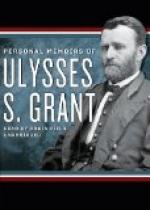The ladies of Galena were quite as patriotic as the men. They could not enlist, but they conceived the idea of sending their first company to the field uniformed. They came to me to get a description of the United States uniform for infantry; subscribed and bought the material; procured tailors to cut out the garments, and the ladies made them up. In a few days the company was in uniform and ready to report at the State capital for assignment. The men all turned out the morning after their enlistment, and I took charge, divided them into squads and superintended their drill. When they were ready to go to Springfield I went with them and remained there until they were assigned to a regiment.
There were so many more volunteers than had been called for that the question whom to accept was quite embarrassing to the governor, Richard Yates. The legislature was in session at the time, however, and came to his relief. A law was enacted authorizing the governor to accept the services of ten additional regiments, one from each congressional district, for one month, to be paid by the State, but pledged to go into the service of the United States if there should be a further call during their term. Even with this relief the governor was still very much embarrassed. Before the war was over he was like the President when he was taken with the varioloid: “at last he had something he could give to all who wanted it.”
In time the Galena company was mustered into the United States service, forming a part of the 11th Illinois volunteer infantry. My duties, I thought, had ended at Springfield, and I was prepared to start home by the evening train, leaving at nine o’clock. Up to that time I do not think I had been introduced to Governor Yates, or had ever spoken to him. I knew him by sight, however, because he was living at the same hotel and I often saw him at table. The evening I was to quit the capital I left the supper room before the governor and was standing at the front door when he came out. He spoke to me, calling me by my old army title “Captain,” and said he understood that I was about leaving the city. I answered that I was. He said he would be glad if I would remain over-night and call at the Executive office the next morning. I complied with his request, and was asked to go into the Adjutant-General’s office and render such assistance as I could, the governor saying that my army experience would be of great service there. I accepted the proposition.
My old army experience I found indeed of very great service. I was no clerk, nor had I any capacity to become one. The only place I ever found in my life to put a paper so as to find it again was either a side coat-pocket or the hands of a clerk or secretary more careful than myself. But I had been quartermaster, commissary and adjutant in the field. The army forms were familiar to me and I could direct how they should be made out. There was a clerk in the office of the Adjutant-General who supplied my deficiencies. The ease with which the State of Illinois settled its accounts with the government at the close of the war is evidence of the efficiency of Mr. Loomis as an accountant on a large scale. He remained in the office until that time.




